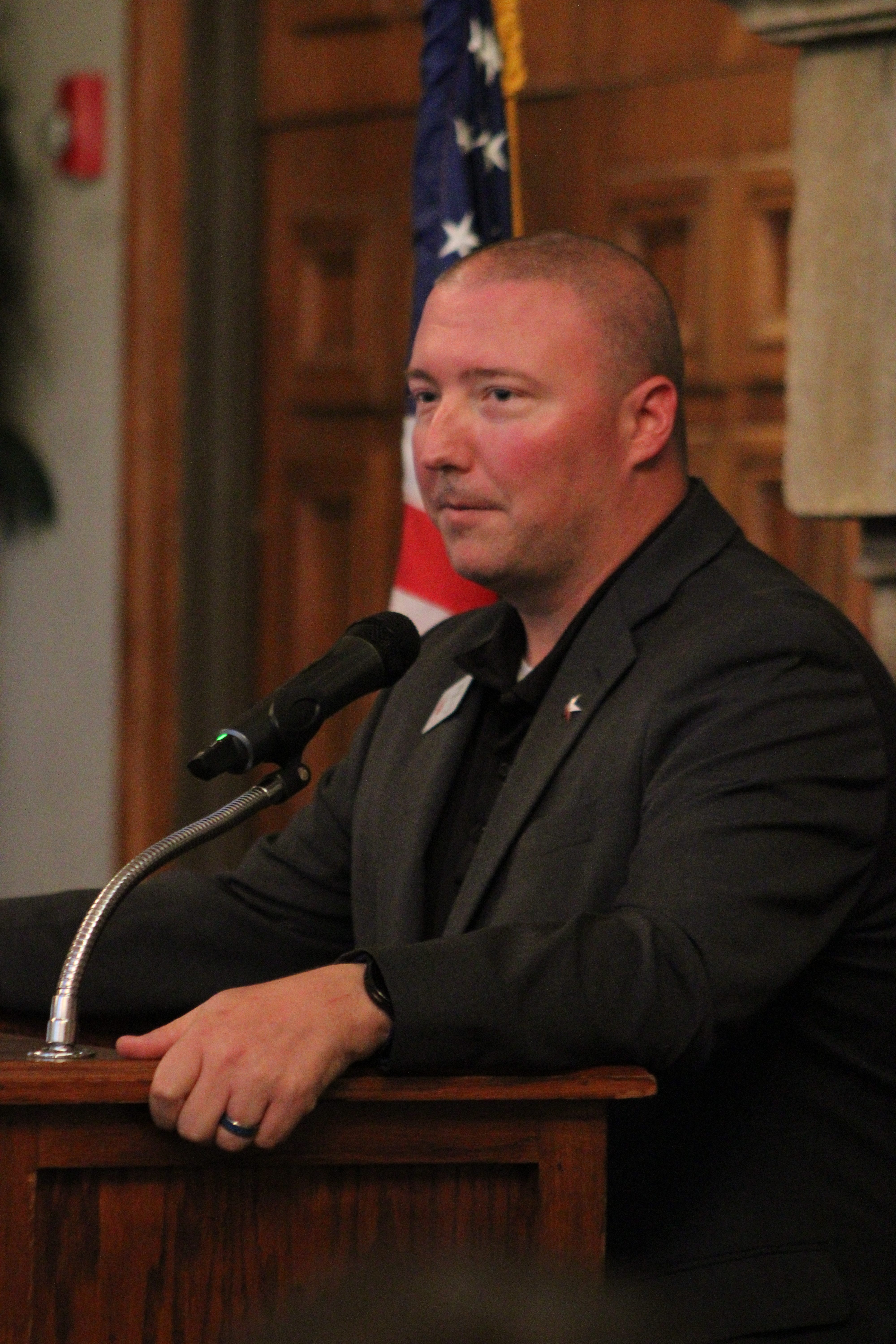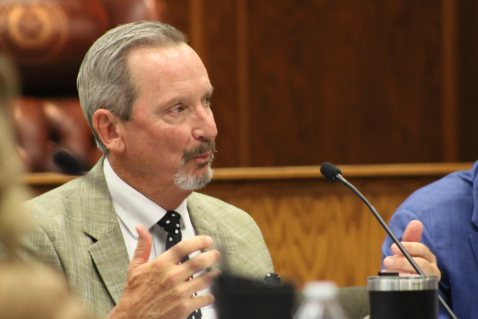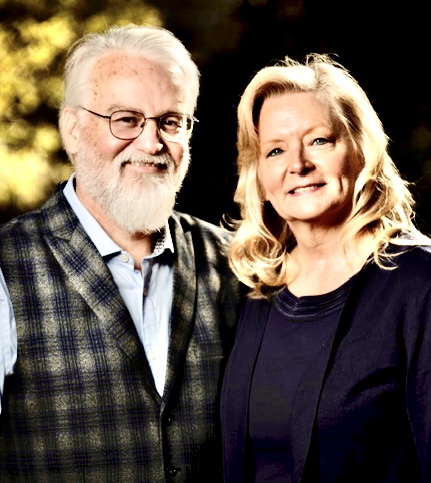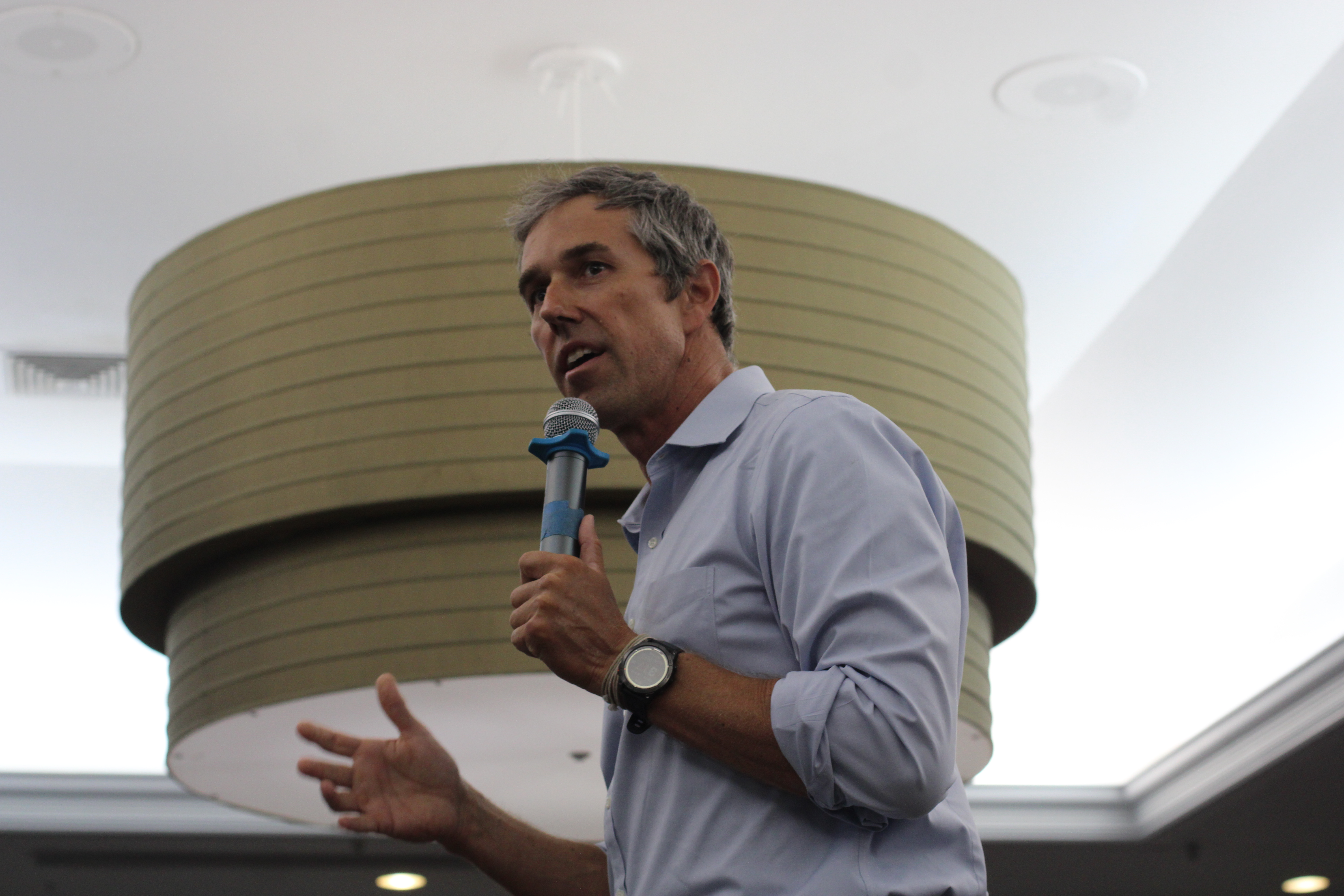State lawmakers recap session, field questions at Tyler town hall
Published 5:45 am Saturday, July 12, 2025








Texas Sen. Bryan Hughes and House District 6 Rep. Daniel Alders hosted a town hall Thursday evening at Hollytree Country Club in Tyler, where about 70 people gathered for a recap of the recent legislative session, updates on the upcoming called special session, and the chance to ask questions.
“It’s an important conversation that we have to ensure that I understand my role representing 200,000 folks here in East Texas and Smith County,” Alders said at the event, hosted by the Smith Country Republican Club. “We’re going to make sure that we are accessible to the community and that our constituents have an opportunity to ask questions and make sure that we know how they feel about the issues that are facing the legislature. I’m happy to do events like this.”
Ten Commandments in schools
A community member questioned how mandating the display of the Ten Commandments in classrooms respects the rights of parents from other religious backgrounds and whether it conflicts with the U.S. Constitution’s Establishment Clause.
Trending
Senate Bill 10 requires every public school classroom in Texas to display a poster or framed copy of the Ten Commandments.
Hughes defended the measure, saying the Ten Commandments are part of the country’s historical and moral foundation, not just a religious document.
“The Ten Commandments are the faces of laws in Western civilization … that’s why they’re supposed to be there,” he said.
Alders said the Ten Commandments reflect foundational principles of American law, particularly in how people treat one another. Regardless of religious belief, understanding their influence is important because they are part of America’s legal and cultural heritage —something worth defending.
“It is our duty as legislators to pass the law and at some point in our foundation, we have to have a reason for passing law,” he said.
Heartbeat Bill
An attendee questioned Hughes, the author of the Texas Heartbeat Bill, about the state’s maternal and infant mortality rates, noting that Texas already had the highest maternal mortality rate in the nation before the bill’s passage and that rate has since worsened. The attendee cited data showing infant mortality increased 13%, neonatal deaths rose 10%, and deaths related to birth defects climbed 23% — disproportionately affecting people of color.
Trending
“With those health outcomes deteriorating, I wanted to know how your leadership on the Heartbeat Bill aligns with the urgent healthcare needs of these Texans,” the attendee said. “I know SB 31 is going to be your answer to this, but my question is why was there a need for a follow-up?”
The attendee also asked what Hughes would say to families of babies and mothers who died in the interim, suggesting the bill was not fully thought through.
“So the Heartbeat Law back in 2021, it recognized that when that little baby is growing inside her mother’s womb, a little human being, the most innocent, the most vulnerable, and the most deserving protection that a human can ever be,” Hughes said. “That little baby growing inside her mother’s womb is deserving of the protection of the law.”
Hughes clarified that the Heartbeat Law preserves existing Texas medical emergency provisions designed to protect the life of the mother, including care for ectopic pregnancies and miscarriages, which are not classified as abortions under state law. However, some doctors and hospitals misapplied the rules after the law’s passage, leading to delays or refusals of care in rare cases.
“We did not anticipate a handful of activists, hospitals and doctors and folks in the media who lied to women and who lied to doctors,” Hughes said.
To address these issues, Senate Bill 31 was enacted to clearly define medical protocols and ensure no ambiguity remains. SB 31 also mandates specialized training for Texas doctors in pediatrics, obstetrics, and oncology to ensure they fully understand their responsibilities in treating pregnancy complications promptly and appropriately.
Foster care
Another attendee raised concerns about the state’s foster care system, asking what actions have been taken to address ongoing challenges, including overcrowding and adoption funding.
“Our state foster care is a mess here in Texas,” she said. “I do think it is an important conversation to have… and ask what your plans are for the foster care system to help with the overcrowding that’s happening now.”
Hughes acknowledged the complexities of balancing child protection with family rights. He highlighted 2023 reforms that reduced child removals by 50%, while lowering injuries and fatalities among children.
“We’ve still got work to do,” Hughes said. “But we’re getting closer to the right place when a child is in danger, they’re removed, they’re protected, but not just because we have different values than the parents or something like that on adoption.”
He also noted increased funding to facilitate adoptions and support children aging out of foster care.
“You cannot murder an unborn child, there need to be alternatives,” Alders added. “There need to be alternatives to abortion and I’m very proud to work with Sen. Hughes, who’s been a leader on that issue. The state has done a lot to ensure there are strong alternatives and there’s more that we can do and we’ll continue to do.”
Election fraud
An attendee asked about measures taken during the recent legislative session to strengthen election security and ensure voter confidence. While acknowledging prior improvements, the attendee sought specifics on new legislation safeguarding access and bolstering trust.
“We made progress on this and, but the senator’s been a key driving force on it,” Alders said. “The job isn’t done though, as most of y’all know, on the governor’s proclamation, he included a line regarding enabling the attorney general to go after election fraud. So I think that’s gonna be an issue that we’re very keen on reinforcing.”
Hughes said most election fraud cases in Texas stem from bad actors such as election workers or paid political operatives rather than voters. He described instances of voter manipulation, particularly involving elderly or first-time voters, and said new legislation increases criminal penalties for knowingly counting invalid ballots or refusing to count valid ones.
State and federal investigations have documented allegations of improper voter assistance, which led to House Bill 5115. Hughes added the legislation strengthens penalties for ballot harvesting, making it a felony for anyone paid by a campaign to possess a ballot.
“If you’re an election worker, and there’s a ballot that you know to be valid, and you refuse to count that ballot, you’re held liable criminally,” he said. “If there’s a ballot that you know is invalid and you count it knowing it, you’re going to be held accountable.”
The law aims to prevent misleading vulnerable voters, including elderly and limited English speakers, and does not apply to unpaid volunteers.
Hughes also noted that Texas requires voters to be U.S. citizens but proof of citizenship is not currently required to register due to federal restrictions. Proposed legislation aims to require citizenship verification at registration.
“We’re gonna verify citizenship at the point of voter registration because voting in U.S. elections is for U.S. citizens,” Hughes said.
Central Texas flooding
Annie Dwyer, 1st Vice President for Smith County Republican Club, asked the lawmakers their thoughts on the state’s response to the recent flooding in Hill Country and how Texas can better prepare for future natural disasters.
“It’s just heart wrenching every day that you see the updated numbers coming out of the Hill Country,” Alders said. “Our hearts break for our neighbors there.”
He acknowledged the complexity of the flooding issue, emphasizing the state’s responsibility to keep Texans safe while recognizing that banning camping or vans by the river is not a straightforward solution.
“We need emergency communication systems in place to let folks know when there’s a natural disaster,” Alders said. “Campgrounds and facilities that take kids in from all over the state need plans to respond rapidly to emergencies.”
Homestead exemption
An attendee thanked lawmakers for efforts to lower school property taxes, noting a constitutional amendment has helped seniors.
“You know the state of Texas is noted for property tax,” Hughes said. “About half of our school taxes are school license and operations taxes. You also pay taxes in the city, the county, and special districts.”
The homestead exemption — the portion of a home’s value exempt from property taxes — was raised from $40,000 to $100,000 two years ago, saving the average homeowner about $500. This session, it increased to $140,000. Homeowners 65 and older are exempt from paying taxes on up to $200,000 of their home’s value at the time they turn 65.
“Many seniors, dare I say most seniors in East Texas, will not be paying any school property tax,” Hughes said. “The savings are real.”
Bipartisan cooperation
An attendee commended the lawmakers for working across party lines.
“Something that gets overlooked is bipartisan from the Texas House,” he said, noting education funding and tax relief bills.
Hughes explained there are 31 senators — 20 Republicans and 11 Democrats — and that in the Texas Legislature, members sit intermixed rather than strictly by party lines.
“In the Texas House and Senate, we all sit jumbled up,” he said. “We don’t hate each other. We eat together, we work together. We differ over some things and the majority rules, but we work together.”
Wrapping up
The session wrapped up by Hughes and Alders highlighting what they said were major legislative victories from the 89th session, including family-focused policies emphasizing parental rights, improvements in infrastructure and public safety, and efforts to fund education — especially teacher pay and school choice.
The lawmakers also discussed judicial reforms aimed at ensuring qualified judges and addressed concerns about foreign interference, particularly from the Chinese Communist Party.
“We are not against Chinese people or Asian people or people of any race or ethnicity,” Hughes clarified. “We are against the Chinese Communist Party. They have sworn they’re against us and they’ve proven it. They’re very aggressive in going after local governments and state governments.”
The lawmakers emphasized ongoing efforts to regulate school food quality and maintain efficient state government staffing despite population growth. The speakers closed by expressing gratitude for the opportunity to serve, encouraging open dialogue, and stressing humility and willingness to listen to constituents.
“We heard from folks all across the political spectrum we talked about food, we talked about water, energy, families,” Hughes said. “It was a really, really good time and you know the format tonight, it was mostly Alders and I answering questions. It wasn’t us giving a speech, it was answering questions. We had some good interaction. I really enjoyed it, learned a lot.”
State lawmakers adjourned their 140-day regular session in early June. The upcoming special session called by Gov. Greg Abbott begins at noon Monday, July 21. Special sessions can run for up to 30 days.
















